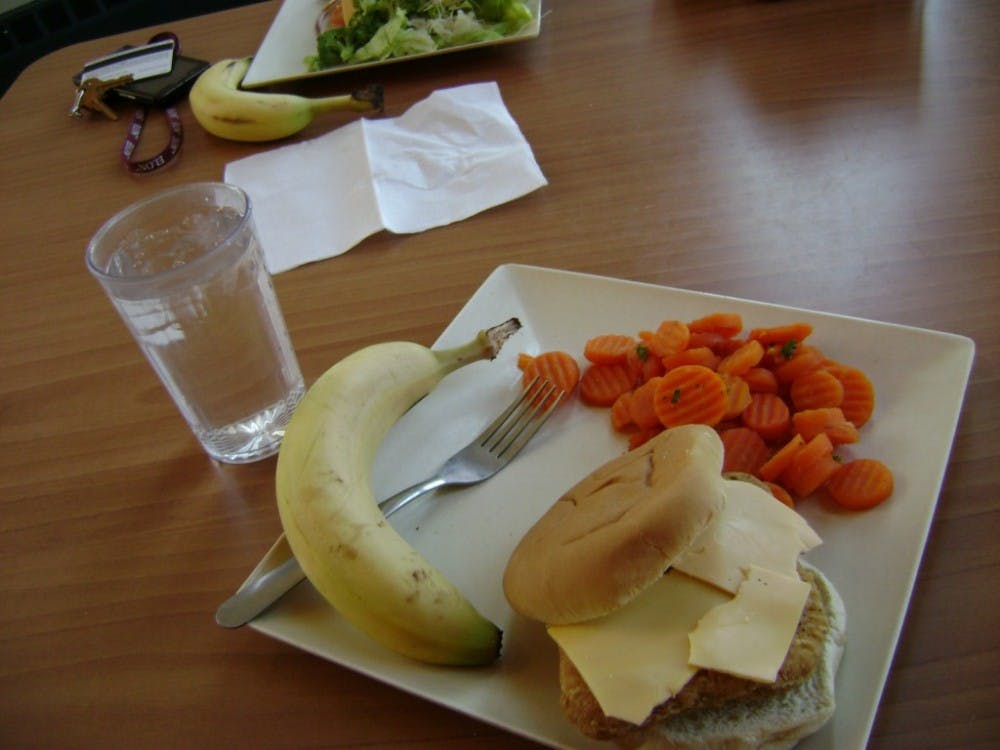In a summer tax code overhaul, a bill stating that university meal plans and live performances would no longer be exempt from sales tax was passed by the North Carolina General Assembly.
Upon returning to campus in 2014, Elon University students have taken notice of increased prices of university meal plans, which before the tax code implementation cost anywhere from $2,500-$6,274 each year. After tacking on the 4.75 percent sales tax levied by the government, in addition to the 2 percent tax required in Alamance County, students are now paying an average of $294 extra each year.
Senior Vice President for Business, Finance and Technology Gerald Whittington said almost every single state has revenue enhancers similar to North Carolina’s newest additions. Whittington recalled that the Department of Revenue has gone back and forth on exempting university meals from sales tax multiple times.
“I think, as a society, we’re just resigned to ‘we’re going to have to pay the tax.’ That’s just how it is,” Whittington said.
Elon students are not nearly as complacent in regards to the increase in prices. Students in dorms at Elon are required to purchase one of the All-Access meal plans, the least expensive of which is $2,328 for the spring semester after the tax.
Junior Allison Hren had already chosen to buy the least expensive meal plan before the sales tax was introduced.
“It was a shock, to be sure,” she said. “College is already expensive enough for people who want to go, and especially with schools like Elon who require you to have a meal plan your freshmen year. It’s definitely a deterrent.”
Some students who do have the choice to downgrade their meal plans or forgo them altogether are planning to take advantage of that option.
“For what it’s costing me now, I know that I can make my own food much less expensively. In the future, I don’t plan on having a meal plan,” Hren said.
In addition to removing the tax exemption for meal purchases, the same sales tax has been added to the prices of tickets for live performances. According to Will Powell, the director of ticket sales for the athletic department, the additional sales tax for sporting events has not yet been applied to Elon.
While athletic ticket prices have not been affected, Powell said there is no way of knowing how they will be impacted in the future.
“I think it would depend on what sport it is, to be honest,” he said. “We obviously don’t want to pass off any additional cost to the consumer unless we have to. But it would definitely have to be a game-by-game and a sport-by-sport determination.”
The realities of the North Carolina sales tax changes have been harsh for students at public institutions as well.
University of North Carolina at Greensboro student body president Crystal Bayne said she met in November with the Association of Student Government, and a collective of North Carolina student governments agreed that the new sales tax would impact students negatively.
“Our biggest concern was that when they come back to school, because of the lack of publicity, there was going to be a lot of sticker shock,” Bayne said.
Bayne said student groups have already noticed the changes. Next week marks the beginning of Winter Fest at UNCG, an event that is sponsored by several groups on campus.
“There’s really no way around this,” she said. “If a student group is selling tickets for $10, that group is only going to receive $9.25. A lot of students have expressed concern with that.”
Representative David Lewis, a sponsor of the bill, said the General Assembly’s goal was to tax a greater number of items in order to decrease the rates at which they were taxed.
When the bill was first passed, university administrators struggled with how they were going to implement the sales tax.
“After conversations with representatives from the universities, it was decided that the universities preferred collecting the tax on the cost of the meal plan instead of collecting it at each transaction,” Lewis said.
By taxing similar products and services, he said the state is avoiding giving certain providers an advantage over others.
“All the vendors of food at Elon – for example, Varsity Sports Grill, Acorn Coffee Shop or Chick-fil-A – have been charging a sales tax on food sold to students,” Lewis said. “It was our intent to treat food sold by dining halls the same way and ask them to collect a sales tax just like every other vendor of food currently does.”


